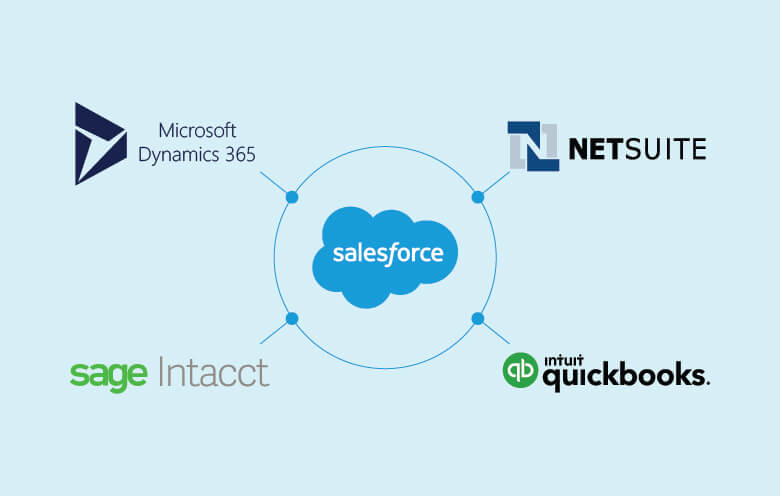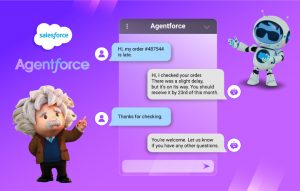In a world where work from home has become the new normal, businesses must adapt to the changing market scenario at the earliest. Companies must also take necessary measures to leverage cloud-based technologies to help employees access information from multiple devices easily. For organizations that have already implemented cloud computing throughout their operations, the key concern for them in these tough times is to measure productivity.
There are a few questions that business owners today find themselves asking:
- How to securely share financial information within departments?
- What areas of business require improvement?
- How can you improve sales performance if you do not have real-time insights into the operations?
The key challenge that hinders companies from getting answers to the questions mentioned above is the disconnection between disparate systems and the lack of data sharing. To address this challenge, organizations can leverage our Salesforce integration services with accounting tools.
With features like easy collaboration, accessibility to critical information and improved account planning, Salesforce offers innovative ways to streamline workflows. Thus, enterprises can gain access to the most up-to-date financial information and avoid repetitive data entry.

Get a Free Salesforce Audit
With a free Salesforce audit, we will help you to build a resilient business roadmap and navigate through it to tackle the challenges and meet your business goals. We can help you with the following services:
- Review your current usage of Salesforce
- Suggest suitable tools and the latest platform features
- Gain visibility across your organization and intensify ROI
- Determine and fix potential vulnerabilities in your security settings
Why is accounting and Salesforce CRM integration important?
Knowing the purpose of your integration
Understanding the reason for Salesforce integration with accounting tools is important to further understand the requirements. Once you have defined the use case for accounting in Salesforce, you also need to understand the capabilities of different accounting tools that will adhere to your purpose. In case you are already using an accounting tool that you want to integrate with Salesforce, you need to check the compatibility. Hence, it is crucial to first understand the purpose of integration to take further steps.
Avoiding bad data
Sure, big data is important. However, not all the data that you collect can be useful. Make sure that you clean your data, as bad data will affect the purpose of integration, resulting in unwanted output. You can address this issue by appropriately labeling your data to the accounting tools that you plan to integrate with Salesforce.
Organizing different data structure
The data structure within the accounting tool that you choose for integrations can be different than that of Salesforce. Often, Salesforce has several customers’ information under a single account, while in accounting tools, a single account might only have information on an individual customer. Therefore, it is imperative to check the data structure before integrating and syncing the data accordingly.
Decide between custom objects and static schema
While dealing with dynamic data, you can leverage custom objects by using labels from Salesforce. On the other hand, static schema can be used for predefined objects and fields. While custom objects allow you to handle complex workflows, static schema can be a more financially fitting option.
What are the benefits of accounting ERP integrations with Salesforce?
- Automated workflow updates for a new customer registration
- Event-driven synchronization of customer status
- Automated updating of customer information
- Automated creation and distribution of sales invoices
- Get customer purchase history to facilitate cross-selling and up-selling opportunities
- Real-time updates on stock availability and most selling product lists
- Real-time automated sales report generation and sharing
What are the examples of accounting software integration with Salesforce?
It is essential to choose the right accounting software to integrate with Salesforce to ensure you get the desired results that help you achieve your business goals. There are many accounting software tools available in the market with their unique offerings. Let us have an overview of some of these accounting tools that can be integrated with Salesforce:
Integrating Salesforce with SAP
SAP is a widely used enterprise resource planning solution in the market. It allows organizations to automate several back-office functions related to accounting, customer services and human resources. Integrating SAP with Salesforce gives you leverage to synchronize data from both systems, enabling you to streamline financial and sales performance management.
Integrating Salesforce with Microsoft Dynamics 365
Microsoft Dynamics 365, a business management solution tool, allows you to connect financial data from different sources like accounting, sales, purchases and inventory. It also provides automated budget planning and sales forecasting. Integrating Microsoft Dynamics 365 with Salesforce will not only help you with keeping customer data synchronized but also allow you to get the most updated financial, product and inventory information. This will enable you to make an insights-driven decision related to budget, sales and supply chain operations.
Integrating Salesforce with Sage Intacct
This accounting tool automates several critical processes like sales and demand forecasting, sales report generation, etc. By integrating Sage Intacct with Salesforce, you can view detailed information about your customers and their interactions with your brand. You can monitor and modify data residing in Sage Intacct with Salesforce. This integration can help your organization to streamline your workflows.
Integrating Salesforce with QuickBooks Online
QuickBooks Online is one of the most used accounting software. You can leverage it to manage bills, generate financial reports, invoices and more. Quickbooks integration with Salesforce’s CRM capabilities enables you to make more accurate decisions about sales opportunities and revenue growth. Moreover, Salesforce CRM integration with QuickBooks provides cohesive information on ROI, estimated marketing expenses, and sales patterns.
Integrating Salesforce with NetSuite
NetSuite is a cloud-based ERP software that offers accounting and financial management, business information management and real-time analytics of financial performance. An accounting ERP integration with Salesforce will provide insights on transactions, accounts and financial reports. It will also offer you automated sales pipeline metrics.
Salesforce and NetSuite integration will provide you with insights on transactions, accounts and financial reports. It will also offer you automated sales pipeline metrics.
QuickBooks Online
QuickBooks Online is one of the most commonly used accounting software. You can leverage it to manage bills, generate financial reports, invoices and more. Quickbooks integration with Salesforce’s CRM capabilities enables you to make more accurate decisions about sales opportunities and revenue growth.
Conclusion
Leveraging Salesforce for accounting makes critical information accessible to your organization. It allows you to minimize information bottlenecks and ensure insights-driven decision-making with an efficient flow of information across business silos to achieve desired business goals. At Softweb Solutions, our Salesforce team has extensive experience in salesforce integration services with business applications. To discuss the integration process in detail, contact our Salesforce experts.










